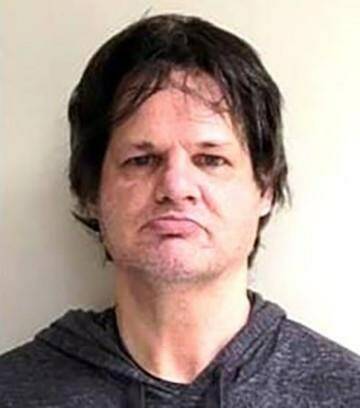The father of a boy abducted in 2011 by Randall Hopley, a high-risk sex offender now wanted on a Canada-wide warrant, said he’s incredulous that Hopley could walk away from a Vancouver halfway house.
Paul Hebert, now living in Alberta, said in a written statement that police did not notify him or his family that Hopley, 58, went missing on Saturday after removing his electronic monitoring bracelet.
Hebert said while he doesn’t have “all the answers,” he believed the “justice system isn’t working” if it allowed Hopley to be placed in a situation where walking away was possible.
Hopley completed a six-year prison term for the abduction of Hebert’s three-year-old son from the family’s home in Sparwood in southeastern B.C., and was released with conditions under a long-term supervision order. He was arrested in January for allegedly breaching those conditions by getting too close to children, but was released on bail.
Vancouver police say Hopley removed the monitoring bracelet from his ankle and disappeared in a likely attempt to avoid a trial that had been scheduled for Monday.
“Randall was released (in 2011) two weeks before my son was abducted,” Hebert said.
“So that says it there, back in 2011, that he is a repeat offender, but more so he is not mentally equipped to be self-sustaining on his own. So why is there not a system in place for someone like Randall?
“And if he is mentally not able to be self-sufficient, should he not be in a different support program, not just for him but for the safety of others as well?”
Hopley held Hebert’s son captive in a cabin for four days before returning him apparently unharmed.
Vancouver police said Hopley likely took “deliberate actions” to avoid Monday’s court date when he told several people that he was going to a nearby thrift store before disappearing.
Hopley has a history of convictions for assault, property offences and sexual crimes that include three offences against children.
The case has attracted attention to the security and monitoring of residents of halfway houses, facilities “for offenders who have been allowed to serve part of their sentence under supervision in the community,” according to the B.C.-Yukon Halfway House Association.
Hank Mathias is the chairman of the board of directors at the John Howard Society of British Columbia, which operates halfway houses across the province.
Mathias said cases such as Hopley’s are very rare and should not detract from halfway houses and their role in the Canadian correctional system.
“My direct experience with the various halfway houses is they are absolutely essential to this whole thing working,” Mathias said. “A lot of people make mistakes. The opportunity to reform and do better exists.”
Mathias said the role of halfway houses is to provide an intermediate step to guide someone released from a prison under some supervision instead of directly introducing them into society, which works against public safety.
He said the John Howard Society assesses individuals who are the best fit to be rehabilitated at halfway houses before their release from prison, and anyone deemed at high risk would not be moved to such a facility.
“Any human decision-making system is fallible,” he said. “The question is, how often do you get it correct and what do the errors look like with respect to looking after public safety and the rehabilitation of people? The halfway houses, they provide a whole lot of stuff that moves us in the right direction.”
Debra Parkes, a professor at the University of British Columbia Allard School of Law, said she is concerned the Hopley case may lead to changes to Canada’s parole system that would unjustly affect thousands of people who do not pose the same risks.
Parkes said the overall Canadian parole system has been skewing toward greater strictness and sending individuals back to prison for minor violations.
She said long-term supervision — the type of release applicable to Hopley — was supposed to place individuals under “intense” monitoring.
“You can look at whether there were issues … there should be a review maybe of what happened in this particular case,” Parkes said.
But she said the case should not give people the impression that Canada’s overall parole system was broken or filled with “unearned leniency.”
“I worry about the reaction that goes to, ‘Oh, we have a big problem here in our system because we have this one case,”” Parkes said. “And I think that’s unfortunately the cycle we often go through — you have one high-profile incident, and then you have the system becoming even more intensely risk-averse than it already was.”
Mathias said the use of electronic monitoring bracelets could warrant discussion in light of the Hopley case.
He said the John Howard Society does not use such devices at its facilities, and the reliance and trust placed in the technology by correctional authorities may need examination.
Mathias said monitoring devices depend on networks for effectiveness, and dropped coverage or weak Wi-Fi signals could wreak havoc with the ability to track individuals staying at a halfway house.
He cautioned against over-reliance on such devices, saying it “doesn’t lead to a sense of confidence about public safety.”
“More effective supervision at this point is not dependent on electronic monitoring,” he said. “It’s a very costly way to do something, and it isn’t quite as reliable as you would like it to be.”
Hebert said he wants a system in which mental health can be supported in a “sufficient” and “structured” way to prevent offenders such as Hopley from further endangering the public.
He added that his family is “well” despite the news of Hopley’s escape and the attention they have received.
“This is part of our life, and (we) do the best as it comes,” Hebert said.
READ ALSO: Hopley slipped bracelet, search for former Sparwood sex offender continues

